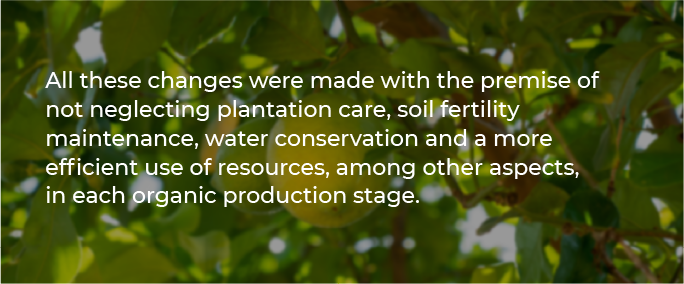Read this news in PDF format here.
At Citrusvil, we work to exceed our customers’ expectations and make a difference. We are aware that being able to adapt to global changes and respond to market demands involves constant updating and innovation in citrus production practices. Therefore, we have undertaken the challenge of incorporating our company into the organic lemon production for industrialization.

In order to understand how we got to these changes, we need to have a look at our journey towards organic production. From the beginning, we have aimed to look for the best means and use them so that an orchard with organic production can look like or even better than one with conventional production.
“We use all the available means so that the plant can reach its maximum potential, and we are also trained by experts on the subject. Today, after two years of this change of direction, we can say that our productivity stands out”. Said José Luis Taddei, Head of Primary Production.
La Ramada Orchard
This orchard is geographically located to the east of Tucumán, Argentina, some kilometers away from the department of Burruyacú, and it has about 225 net hectares of production.
Lemon plantations in this orchard were made in two stages: the first one took place in 2009 and involved 60 hectares; the rest was planted in 2012, during the second stage.
Until the beginning of 2019, we developed conventional production, and, in that year, we changed to an organic method.
“This change of direction that took place in the orchard involved a technical transformation, and the team had to learn new challenges”, explained Taddei.

The Conversion Stage
The conversion from conventional to organic farming meant a learning opportunity. Our commitment to health, safety and certified quality was our banner. In order to achieve our goals, we invested in training our collaborators and hired a consultant specialized in this type of farming. In this way, we learnt about the characteristics of organic production and the tasks required in the transition period in order to reach our goal.
“These insights meant a change of perspective to us. We stopped thinking about organic production as something with no intervention at all, and we started considering it a technique adapted to certified and registered rocesses”. Stated Juan Altamiranda, Primary Production Manager.
We also got information about suppliers of organic production materials, sanitary conditions for the access of the fruit to the industrial plant, the cleaning process of the vehicles transporting the products and hygiene elements for harvesting fruit of such characteristics, among other things.
“If we compare both production methods, they are very similar when it comes to farming tasks. They differ in the technology related to the use of fertilizers and agrochemicals destined for the production of organic crops”, highlighted Taddei.

In this learning process, “the team undertook the challenge with great commitment in order to adapt to the change and progress in line with the requirements of the standards regulating this certification”, pointed out Altamiranda.

From Our Orchard to Industrialization
The demand of organic products is growing, and, at Citrusvil, we have undertaken this challenge.
“We are interested in selling certified organic lemon juice to all our customers as well as by-products such as oil and pulp by 2023″. Alex Nolte, Industry Department Commercial Manager.
But that is not all. We aim to adapt other orchards having the same conditions as the ones in La Ramada in the coming years.

Organic Quality
Organic production is aimed at maintaining and improving soil fertility and biological diversity, protecting crops and animals from plagues as well as weed. For such purpose, observing and learning about the natural cycles of the elements and living things is considered, and different techniques which do not involve the use of chemically synthesized products or genetically modified organisms are applied.
The organic condition of a product is a quality attribute that guarantees that it meets additional requirements apart from those for conventional products.
Certification
Organic production involves a certification process that guarantees traceability of the industrial organic products to the field where they were produced.
Juan Altamiranda, Primary Production Manager, explained that we are working with two primary production programs: SUE (SENASA [Argentine Service for Agri-Food Safety and Quality]- European Union), which requires 36 months of conversion; and the NOP program, which requires 12 months of conversion. At Citrusvil, we are training to get the certification for both markets.
“The Quality Assurance Department accompanies this process from field to factory, so that we can have certified industrial organic products”. Noelia Lescano, Head of Quality Assurance and Environment.
Did You Know that…?
There is a clear market trend to consume food products which are as natural (fresh and wholemeal) as possible and which come from environmentally sustainable sources. Moreover, there is a clear interest from consumers and the general public to learn about who produces their food, where and how.
Although the domestic demand of these products is still low in Argentina, it is growing at a good pace, and organic consumption is predominant in developed countries due to awareness and purchasing power.



